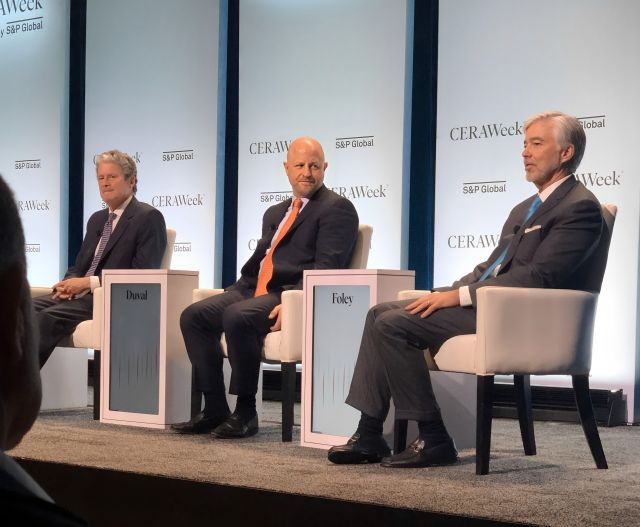
(Left to right) Bob Maguire, Brendan Duval and David Foley speaking at CERAWeek by S&P Global. (Source: Nissa Darbonne/Hart Energy)
The lower-carbon transition is purely policy-driven and couldn’t exist without policy support, including lucrative government tax incentives, private-equity leaders said March 19.
“Normal transitions are driven either by the market or by technology,” said Bob Maguire, managing director and partner at The Carlyle Group. “This is neither.”
Maguire and other investors spoke at CERAWeek by S&P Global in Houston.
The policy-driven strategy is “inherently fragile,” Maguire said. To survive, it would have to be bolstered by a “market-driven sort of metric, such as ‘I will pay you if you reduce my carbon intensity.’ That’s pretty powerful.
“Otherwise, ‘Why am I doing it? Because I’m going to go to heaven? Because I’m worried about [carbon]?’ If you could actually say ‘I’m doing it because I’m going to get value’ that’s the important development I think would support the overall transition.”
The session moderator said technology is playing some role.
Maguire replied, “It does, but it is not driving [it]. It has to supplement. It has to come from behind to support policy as opposed to ‘I've invented the wheel, then everything else follows.’”
Gabe Caillaux, head of climate, co-president and managing director of General Atlantic’s Eastern Europe and Middle East business, agreed that the transition is policy-driven.
He added that there is an investment disconnect between it and the technology needed.
The capital that is flowing to the transition is a $50 billion market and, “if it continues to compound, is going to become a much larger number.”
Meanwhile, technology investment “is a fraction of the trillions of dollars that are needed for an energy transition, whichever number you believe in, but it's still a $50 billion annual investment market.”
In terms of which sectors of the energy transition are viable investments, thus justifying investment in the technology, he said to Maguire, “I think you're right.”
“Right now, it is extremely difficult to see which technologies are going to have commercial viability outside of policy support and that is not a sustainable position, we think, for long-term growth investing.”
Which technologies will win on their own needs to be known—that is, "Which actually provide value to the end customer and which have an economic life beyond any kind of support it gets from policy?” Caillaux said.
Brendan Duval, founder and CEO of Glenfarne Energy Transition, which operates in the LNG, grid reliability and renewables sectors, said some countries are “not interested in the amount of carbon production.
“They just want to make sure the electricity comes on, that the generator doesn't go out when the kid’s in the hospital or the supermarket doesn't lose all their meat,” Duval said.
Recommended Reading
US Raises Crude Production Growth Forecast for 2024
2024-03-12 - U.S. crude oil production will rise by 260,000 bbl/d to 13.19 MMbbl/d this year, the EIA said in its Short-Term Energy Outlook.
Iraq to Seek Bids for Oil, Gas Contracts April 27
2024-04-18 - Iraq will auction 30 new oil and gas projects in two licensing rounds distributed across the country.
Oceaneering Won $200MM in Manufactured Products Contracts in Q4 2023
2024-02-05 - The revenues from Oceaneering International’s manufactured products contracts range in value from less than $10 million to greater than $100 million.
E&P Highlights: Feb. 5, 2024
2024-02-05 - Here’s a roundup of the latest E&P headlines, including an update on Enauta’s Atlanta Phase 1 project.
CNOOC’s Suizhong 36-1/Luda 5-2 Starts Production Offshore China
2024-02-05 - CNOOC plans 118 development wells in the shallow water project in the Bohai Sea — the largest secondary development and adjustment project offshore China.




